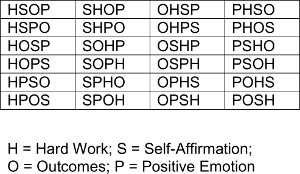Within-subjects Repeated-measures Design
Overview
Source: Laboratories of Gary Lewandowski, Dave Strohmetz, and Natalie Ciarocco—Monmouth University
A within-subjects, or repeated-measures, design is an experimental design where all the participants receive every level of the treatment, i.e., every independent variable. For example, in a candy taste test, the researcher would want every participant to taste and rate each type of candy.
This video demonstrates a within-subjects experiment (i.e., one where there is an independent variable with several variations or levels) that examines how different motivational messages (e.g., hard work, self-affirmation, outcomes, and positive affect) influence willingness to exert physical effort. As a within-subjects design, the participant will read each of the four types of motivational messages and then lift weights to measure physical effort. By providing an overview of how a researcher conducts a repeated-measures experiment, this video allows viewers to see how to address order effects through counterbalancing, which involves a systematic approach to making sure all possible orders of the conditions occur in the study.
Psychological studies often use higher sample sizes than studies in other sciences. A large number of participants helps to ensure that the population under study is better represented and the margin of error accompanied by studying human behavior is sufficiently addressed. In this video, we demonstrate this experiment using just one participant. However, as represented in the results, we used a total of 72 participants to reach the experiment’s conclusions.
Procedure
1. Define key variables.
- Create an operational definition (i.e., a clear description of exactly what a researcher means by a concept) of a motivational message.
- For the purposes of this experiment, a motivational message is any combination of image and phrase designed to energize a person’s behavior, manipulated here by viewing a series of images accompanied by empowering quotes focusing on one of 4 areas: hard work, self-affirmation, outcomes/success, and general positive feelings/
Results
The procedure was repeated three times in 24 counterbalanced orders, so data were collected from 72 total participants. A large number of participants is necessary to ensure that the results are reliable. If this research were conducted using just a few participants, it is likely that the results would have been much different and not reflective of the greater population.
To determine if there were differences between the motivational messages on physical effort, we performed a repeated-
Application and Summary
Repeated-measures within-subjects designs are particularly common in functional magnetic resonance imaging (fMRI) research. Participants lie in an fMRI machine and experience several conditions to see how the brain reacts to different experiences.
For example, one fMRI study wanted to determine which areas of the brain correlate with feelings of long-term and intense romantic love.1 To test this, participants saw each of the following images: a highly fa
References
- Acevedo, B. P., Aron, A., Fisher, H. E., & Brown, L. L. Neural correlates of long-term intense romantic love. Social Cognitive And Affective Neuroscience. 8 (2), 145-159. doi:10.1093/scan/nsq092 (2012).
Skip to...
Videos from this collection:

Now Playing
Within-subjects Repeated-measures Design
Experimental Psychology
23.0K Views

From Theory to Design: The Role of Creativity in Designing Experiments
Experimental Psychology
18.3K Views

Ethics in Psychology Research
Experimental Psychology
29.1K Views

Realism in Experimentation
Experimental Psychology
8.3K Views

Perspectives on Experimental Psychology
Experimental Psychology
5.6K Views

Pilot Testing
Experimental Psychology
10.3K Views

Observational Research
Experimental Psychology
13.0K Views

The Simple Experiment: Two-group Design
Experimental Psychology
73.8K Views

The Multi-group Experiment
Experimental Psychology
22.8K Views

The Factorial Experiment
Experimental Psychology
73.2K Views

Self-report vs. Behavioral Measures of Recycling
Experimental Psychology
11.8K Views

Reliability in Psychology Experiments
Experimental Psychology
8.5K Views

Placebos in Research
Experimental Psychology
11.6K Views

Manipulating an Independent Variable through Embodiment
Experimental Psychology
8.5K Views

Experimentation using a Confederate
Experimental Psychology
17.8K Views
Copyright © 2025 MyJoVE Corporation. All rights reserved





